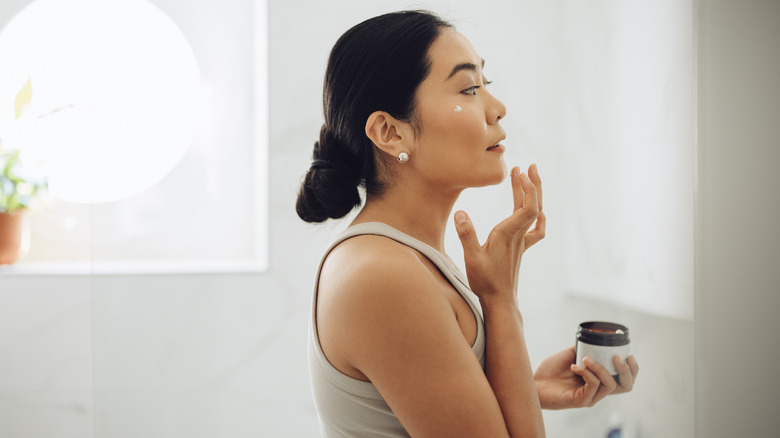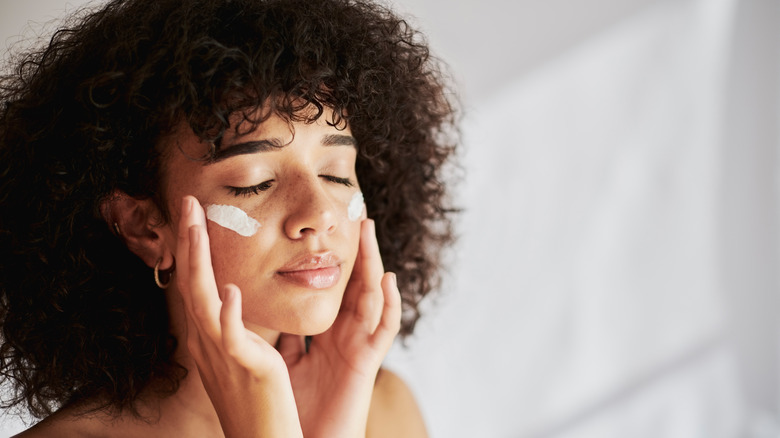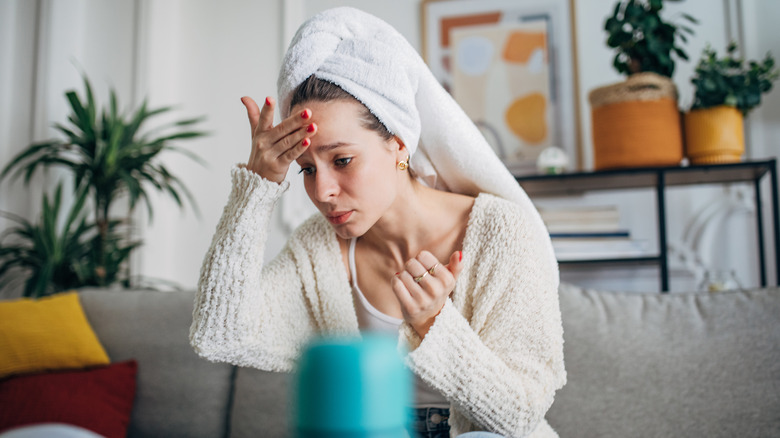Here's Exactly What Sulfur Can Do For Your Skin
You might think of sulfur as the rotten egg-smelling substance that's typically found in volcanos and fertilizer, and you're not wrong. However, we're here to discuss its uses as skincare. Sure, it sounds crazy to put something that stinky on your face, but did you know that sulfur can actually be a great addition to your skincare routine? As Shereene Idriss, M.D., and board-certified dermatologist, explained in her recent and very popular TikTok video (it currently has 2.4 million views), "Sulfur acne treatments are the treatments you didn't know you needed, especially if you have oily skin." (If you aren't sure what kind of skin you have, we can help you find out.)
From sloughing away dead skin to serving as a gentler alternative to acne treatments, sulfur can help with a wide array of issues in addition to helping dry up oilier skin. Plus, more modern product blends using sulfur have figured out ways to decrease that infamous smell, making sulfur more accessible than ever. It's also worth mentioning that some of the most effective sulfur products on the market are also extremely affordable (Idriss hypes a sulfur ointment in her video that clocks in at only $5). Let's explore the benefits of sulfur and see if it could be worth adding to your skincare routine.
Benefits of sulfur skincare
There are so many benefits of sulfur (it honestly might be easier to list the things sulfur can't do) that it's hard to believe it isn't more popular in skincare yet. For starters, sulfur is antimicrobial, meaning it can and will kill the bacteria on your skin that can lead to pimples and blemishes. Plus, sulfur inhibits the build-up of oil and cells within your pores which can lead to whiteheads and blackheads. By acting as a gentle exfoliant, sulfur can also help to break up any pore buildups you already have.
In case you don't already know everything there is to know about pores, your skin actually produces an oily substance known as sebum. Sebum is found in your hair follicles and it essentially protects your skin from drying out. However, the glands that produce this sebum are prone to clogging which can lead to blemishes and other issues (if you are someone who deals with an oily T-zone, you know what we mean). This is where sulfur comes in since it is a way to regulate your skin's sebum production naturally.
Last, but certainly not least, sulfur has anti-inflammatory effects that are great for reducing puffiness and helping with swelling around blemishes, pimples, rashes, and breakouts. This is helpful for just about everyone's skin, but especially for those with chronic skin problems. Sulfur can be extremely helpful if you are someone who struggles with rosacea, seborrheic dermatitis, psoriasis, or eczema.
Potential drawbacks to using sulfur
The same quality that makes sulfur great at drying out blemishes and helping oily skin can also be a downside depending on your skin type. People who struggle with dry skin might want to minimize their use of sulfur products since sulfur products can increase the appearance of dry skin. For this skin type, using sulfur as more of a spot corrector could be a better option.
Even though sulfur is generally a much more gentle option over other acne medications, it still might not be the best choice for acne sufferers. Sejal Shah, MD, a board-certified dermatologist, explained to Byrdie, "Sulfur-based products tend to work best for mild-to-moderate acne, primarily whiteheads, blackheads, and papules. It typically isn't as effective for more moderate-to-severe acne, especially as monotherapy."
It's especially important to avoid using other drying or exfoliating products at the same as sulfur since you run the risk of inflaming your skin and/or making it extremely dry. If you'd like to add sulfur to your skincare routine, look out for (and try to avoid) combining it with retinoids, benzoyl peroxide, or salicylic acid. It's important to consult with your dermatologist before changing up your skincare routine, especially if you have sensitive skin or chronic skin conditions.


